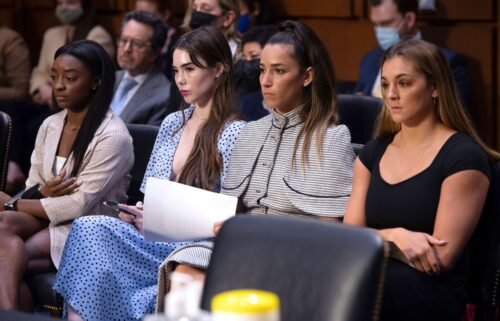Anti-riot laws vs. police reform as the US waits for Chauvin verdict
It is not the job of jurors in the trial of former Minneapolis Police Officer Derek Chauvin to issue a verdict on American policing or racial justice, but their coming decision in the trial of the White cop who knelt on a Black man’s neck for nine minutes has many in the country primed for a real turning point, one way or another.
The visual documentation of the crime against George Floyd, the year of protest it unleashed and now the wall-to-wall coverage of the trial have supercharged expectations heading into jury deliberations that will decide Chauvin’s guilt, but also have come, in anticipation, to feel like a moment of justice.
We have been here before, with the trials of those who attacked Rodney King, Trayvon Martin and Breonna Taylor. More than ever, the country feels like it’s looking for some accountability, even if the jury is being asked to judge one man.
Already the reckoning over policing has led to new state laws, many of which break along the normal political lines — but some of which don’t.
Round up the usual suspects. Falling along the normal, cynical political lines is the new raft of so-called “anti-riot” or “anti-mob” bills, pushed by Republicans like Gov. Ron DeSantis in Florida. Similar efforts are underway in Arizona and Iowa, where Republican-controlled state governments have all also moved to make absentee and mail-in voting more difficult.
DeSantis on Monday framed the legislation as “pro-law enforcement,” citing the Chauvin trial as he signed Florida’s new law, which creates new penalties for taking part in a mob, cuts down on bail for people arrested and charged with taking part in a mob and creates a new defense for individuals who fight off rioters.
Democrats and activists said the law would cut down on protesters’ ability to assemble and have a chilling effect on the very American acts of protests and nonviolent civil unrest.
Florida is not alone. Tennessee is considering giving immunity to drivers who unintentionally hit protesters in the streets.
Irony alert. We have to mention here that DeSantis and other Republicans arguing for personal freedoms from the government in terms of Covid-19 and public safety are here cutting down on personal freedoms. And some of the same Democrats arguing for Covid restrictions oppose DeSantis’ move.
But there is bipartisanship too. Less cynical than the “anti-mob” legislation DeSantis wants to label as “pro-police” is the bipartisan legislation moving more slowly in Florida that would ban police chokeholds.
“This is the sort of work product that we come up with when we’re willing to put partisanship aside and try to focus on policy that will help make our communities safer, that will build trust between the law enforcement community and especially communities of color,” State Rep. Fentrice Driskell, a Tampa Democrat, told the Tampa Bay Times last week.
It will be interesting to see if DeSantis, who has worked hard get headlines that endear him to conservatives, will back a bipartisan bill pushed by the state’s Black Caucus.
Democrats overruled a moderate Republican. Maryland went much further with its police reform effort, banning no-knock warrants, creating a statewide use-of-force standard and proposing up to ten years in jail for cops found to violate it. The Democrats who control the state’s legislature overruled moderate Republican Gov. Larry Hogan’s veto to make the bill law.
He said the original aims of the bills had been overtaken by “political agendas.”
There is the potential for federal policing legislation, but until large numbers of Republican senators buy in, I will remain skeptical it can pass.
President Joe Biden, while supportive of the legislation that is named for George Floyd, is clearly more focused on his infrastructure plan at the moment and has backed off a campaign promise to create a police oversight commission.
Many, many local police reforms. There have been scores of new laws passed at the state and local level. The New York Times found 140 police reform measures passed in 30 states. That’s a remarkable number.
The pieces are there for an explosive situation. Videos of police intimidating or killing Black men continue to surface with alarming regularity.
It’s clear that, a year after Floyd’s death and as the cop who killed him faces a jury, the problem of policing is far from solved.
Rep. Maxine Waters, a California Democrat, was in Minnesota over the weekend at a Black Lives Matter rally to protest the killing of Daunte Wright by a police officer who apparently grabbed her gun rather than her Taser to restrain him. She told reporters that protesters should “get more confrontational” if there is a not guilty verdict in the Chauvin trial.
“We got to stay on the street. And we’ve got to get more active, we’ve got to get more confrontational. We’ve got to make sure that they know that we mean business,” she said, drawing criticism for encouraging Minnesotans to ignore a curfew if they must.
” ‘Curfew’ means I want you all to stop talking. I want you to stop meeting. I want you to stop gathering. I don’t agree with that,” she added.
Her comments drew criticism from top Republicans in Congress, prompting Waters to tell theGrio she is “nonviolent.”
That didn’t stop the judge in the Chauvin trial from addressing Waters’ comments on Monday as he rejected a motion from Chauvin’s defense lawyers for a mistrial, saying that the congresswoman “may have given you something on appeal that may result in this whole trial being overturned.”
“I wish elected officials would stop talking about this case, especially in a manner that is disrespectful to the rule of law and to the judicial branch and our function,” Judge Peter Cahill added. “I think if they want to give their opinions, they should do so in a respectful and in a manner that is consistent with their oath to the Constitution, to respect a co-equal branch of government.”
He went on, “Their failure to do so I think is abhorrent, but I don’t think it’s prejudiced us with additional material that would prejudice this jury.”



